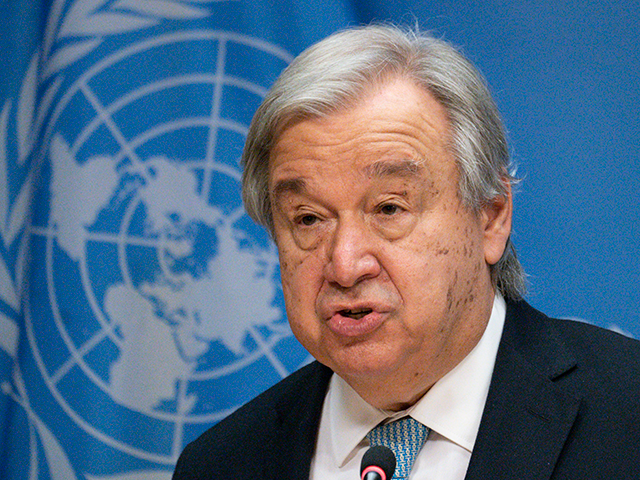U.N. Secretary-General Antonio Guterres claimed on Monday that humanity would be committing “collective suicide” by ignoring climate change — a problem he suggested humanity could only address by breaking its “addiction” to fossil fuels.
“Half of humanity is in the danger zone, from floods, droughts, extreme storms and wildfires. No nation is immune. Yet we continue to feed our fossil fuel addiction,” Guterres said at the Petersberg Climate Dialogue in Berlin.
“We have a choice. Collective action or collective suicide. It is in our hands,” he insisted.
Guterres criticized “multilateral development banks” for not delivering “investments and assistance needed to expand renewable energy and build climate-resilience in developing countries.”
“Demand that these banks become fit-for-purpose. Demand that they change their tired frameworks and policies to take more risk,” he said.
The UK Guardian suggested the prospects of the climate change movement, and particularly its desire to hold another major U.N.-backed climate summit this year, have “dimmed considerably in recent months” because rising energy and food prices “have engulfed governments in an inflationary cost-of-living crisis, prompted in part by the gradual emergence from the [Chinese coronavirus] pandemic, and exacerbated by the war in Ukraine.”
The Guardian might not want to put it so bluntly, but people worried about high inflation, collapsing standards of living, and a worsening energy crisis might not have much patience for the ideas Guterres bandied about with climate ministers in Berlin — especially not when calamities such as the collapse of Sri Lanka are demonstrating how much damage Green proposals can do.
Green energy is proving to be an expensive disappointment for countries that sank uncounted billions of dollars into solar panels and windmills, only to discover those boutique – and quite possibly environmentally devastating! — technologies offer no real alternative to oil, gas, and coal.
When Russia threatens to shut down German industry by cutting off its gas supply, the Germans cannot respond by spinning their windmills faster, or hoping the sun will shine more brightly on their solar panels.
As for developing nations, they seem more interested in developing their oil and gas resources than taking out billion-dollar loans to buy windmills. A world teetering on the brink of a food crisis, which would bring death and starvation to poor countries, is less receptive to schemes that would dramatically increase the cost of harvesting and shipping food.
The climate movement also faces the considerable problem that while fossil fuels have made some unpleasant regimes rich and influential over the years, “green energy” alternatives will make the world almost entirely dependent on the most malevolent fascist power in the modern world, the People’s Republic of China.
As the Chinese are fond of pointing out, they have a nearly unbreakable monopoly on many of the vital components needed for solar power and electric vehicle batteries. Even the Biden administration is beginning to grudgingly admit that the all-out drive for green energy is making the free world dangerously dependent on a tyrannical empire that still practices slavery.
Even as they corner the market on green energy technology, the Chinese are cheerfully digging and burning titanic amounts of coal, and they have absolutely no intention of stopping. Neither do up-and-coming industrial powerhouses such as India, which is importing coal to feed its ravenous appetite for energy even though it was already the world’s largest coal miner.
Leaders across the developing world can read the news, so they might not see any reason to impoverish themselves with low-energy lifestyles or rack up astronomical amounts of debt buying “green technology” while China and India gobble up all the fossil fuels they can get. Few of those leaders would relish the notion of turning their countries into the next Sri Lanka.
